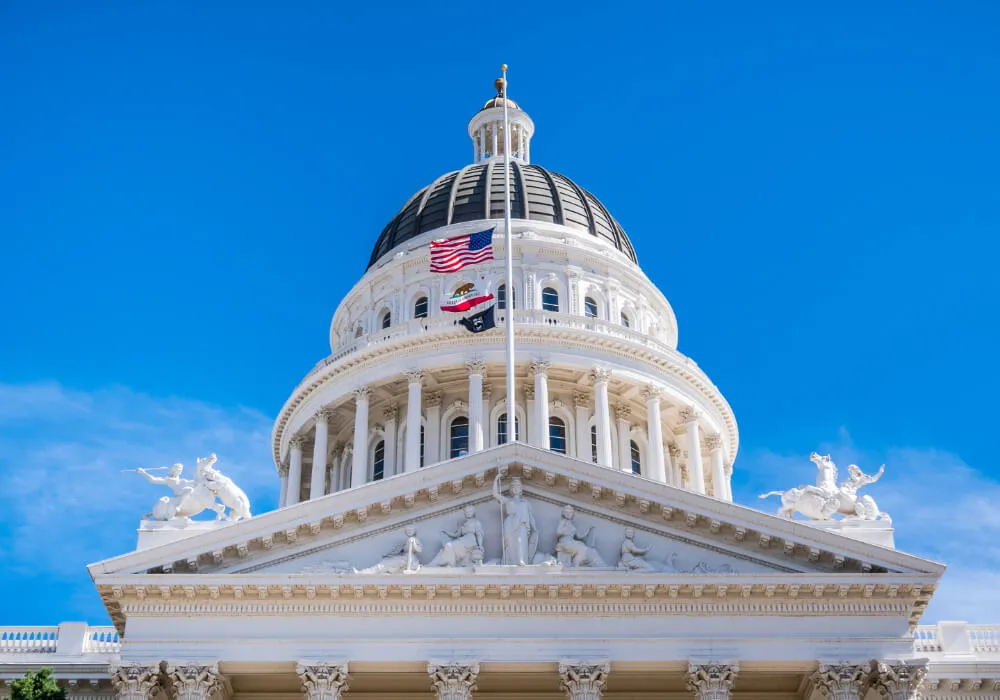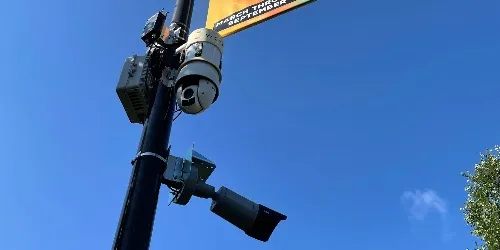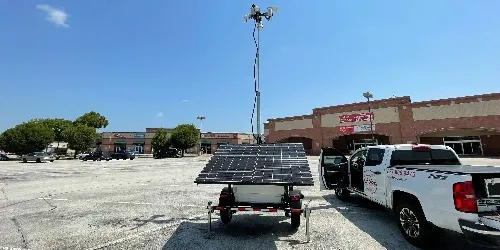We outline the key legislation governing the use of surveillance cameras in the State of California as of May 2024. With WCCTV's expert guidance, you can stay informed and compliant.
Surveillance Camera Use in California
When someone mentions cameras in California, our thoughts generally turn to the cameras associated with capturing blockbuster movies or those utilized by the paparazzi to snap our Hollywood heroes.
But there's another type of camera that's becoming increasingly prevalent across the Golden State: Surveillance Cameras.
With the largest population of any US State, the 5th largest economy in the world, a wide range of crime challenges, and ongoing investment in infrastructure and energy, California has a growing need to ensure the security and safety of its people and property.
Below, we outline some of the key reasons why the use of surveillance cameras in California is growing and outline the legislation and regulations that govern the use of surveillance camera technology in California.
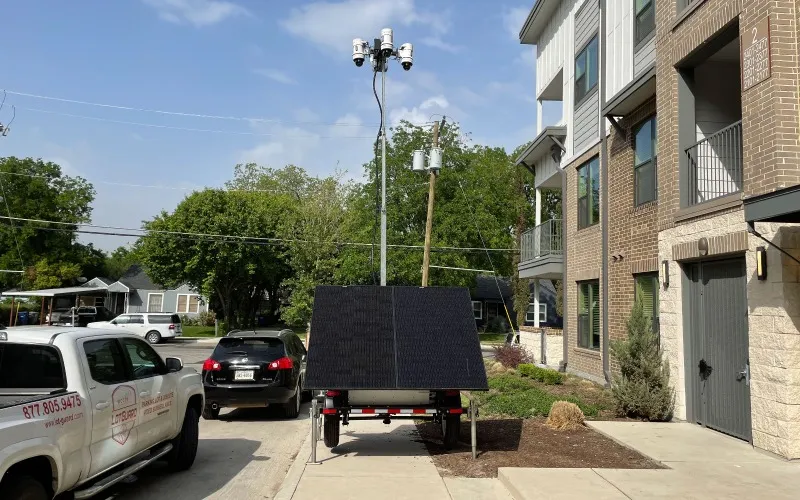
Why Has The Use of Surveillance Cameras in California Increased?
There has been a growing adoption of surveillance camera technology in California, driven by a combination of increasing security concerns, advancements in surveillance camera technology, and their cost-effectiveness as a security solution.
Some specific factors that may have led to the push for more surveillance cameras in California include:
Increase in residential construction sites:
The increase in State-initiated multi-family residential construction projects, coupled with a significant rise in the cost of construction materials, has led to thieves heavily targeting jobsites in California. California sits just behind Texas as the state with the highest number of construction site thefts, increasing the need for temporary construction site surveillance cameras in California.
Renewable energy projects
California is leading the way in the push towards sustainable energy generation, with billions of dollars invested in projects such as offshore wind farms and solar farms. As of May 2024, there are over 6,830 major solar projects in California. These sites, which are typically located way off-grid, present a natural attraction to thieves who target valuable cables and solar panels, driving the need for the deployment of remote surveillance cameras.
Rising crime statistics
In recent years, California has seen increases in both violent crime and property crime rates. In 2022, the violent crime rate in California was 31% higher than the national average, and there were spikes in property crimes, such as vehicle theft and burglary, that placed the Stare way above the national average.
Vacant properties
The number of vacant commercial properties in California has significantly increased since COVID-19 due to changing economic conditions and the rise of remote and hybrid working.
As of early 2024, around 25% of commercial offices in San Francisco were reported to be vacant, with some buildings experiencing even higher vacancy rates due to the departure of major tenants.
Vacant properties present several security challenges, such as preventing illegal encampments and protecting against vandalism and arson - prompting businesses and law enforcement to invest in specialized property security cameras.
Homelessness
Homelessness in California has significantly increased over recent years. As of 2022, California had the largest homeless population in the United States - close to 200,000 people. The State accounts for over 30% of the nation's total homeless population.
Drawing a direct correlation between a rise in homelessness and increased crime rates is problematic. However, it is apparent that issues such as substance abuse, theft, illegal encampments, and other problems are inexorably linked with homelessness.
Cannabusiness
The legalization of cannabis for both medicinal and recreational purposes in California has created a booming industry, with over 6,000 licensed cannabis businesses now operating in California.
These businesses include growing farms, dispensaries, and other facilities. This has had a direct impact on the rising demand for surveillance cameras, primarily because dispensaries are legally mandated to use surveillance cameras by the California Department of Cannabis Control.
Surveillance Camera Laws in California: Overview
Like most states, California laws allow the use of surveillance cameras for personal and business security.
Californians have every right to defend themselves against crime via the use of surveillance technology and remote video monitoring.
However, several laws dictate exactly where cameras can be placed, where their use is prohibited, and how they record.
What is Considered Illegal Surveillance in California?
California Penal Code Section 647(j)(3) prohibits the invasion of a person's privacy by using cameras in places where individuals have a reasonable expectation of privacy.
This includes bedrooms, bathrooms, changing rooms, fitting rooms, tanning booths, and any other situation where the expectation of privacy exists.
Is it Legal for Surveillance Cameras to Record Audio in California?
In California, the recording of audio, including audio recordings made by surveillance cameras, is subject to some of the strictest regulations in the US.
California Penal Code 632 forbids the recording of a 'confidential communication' without the express permission of all parties involved. This makes California a 'two-party consent' State, in contrast to, for example, Texas, which is a one-party consent state.
In practice, this means that you must obtain consent from all parties involved before recording a confidential communication.
But what is a confidential communication? Similar to the restrictions on where cameras can record, as listed above, confidential communications take place where an individual has a reasonable expectation of privacy, such as in their home, office, or private meeting space.
Audio recordings may be permissible in public spaces where there is no reasonable expectation of privacy (such as streets, parks, or certain business premises). However, to avoid potential legal issues, it is still recommended that clear notices be posted to inform individuals that audio recordings are taking place.
Do I Need to Post Signs if I Have Installed Surveillance Cameras in California?
There are no requirements to post signs notifying people you have installed security cameras in California or any other state, as long as the cameras have been installed in a public place where people do not have a reasonable expectation of privacy.
However, for many reasons, it is considered best practice to install signage - even if it isn't a legal requirement.
There is a dual benefit to installing signs notifying individuals they are being recorded:
- The signs will act as a deterrent to anyone considering engaging in illegal activity
- They will help you stay on the right side of all privacy regulations
At WCCTV, we install surveillance cameras at construction jobsites, parking lots, and commercial properties across California. We always offer our clients the option of installing highly prominent signage to help with the surveillance cameras' overall deterrent factor.
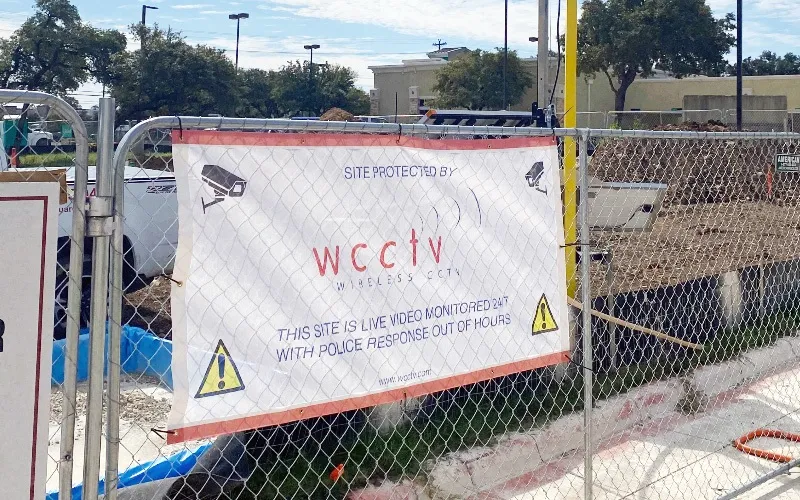
Do Surveillance Camera Installers in California Require a License?
Surveillance camera installers in California must hold a C-7 Low Voltage Systems Contractor license issued by the California Contractors State License Board (CSLB).
This license allows them to install, service, and maintain low-voltage systems, including surveillance cameras and other related security systems such as alarms and fire detection systems.
Utilizing a licensed installer provides multiple benefits, such as:
-
Professional quality installation services with effective camera placement to keep your organization secure and compliant
-
Quality workmanship to protect against electrical issues and camera failure
-
Recourse through your state licensing entity if the installer does a poor job
-
Protection against scammers, fraud, and criminals who use security camera installation as a cover
Are Covert Surveillance Cameras Legal in California?
The use of covert surveillance cameras in California is permissible under a number of specific circumstances:
- The location of the camera must not invade a person's privacy (this would include cameras placed in changing rooms, bathrooms, etc)
- The camera must not record audio of any confidential communication without the consent of all parties involved
Covert surveillance cameras are a powerful tool for gathering evidence of a crime and can help secure arrests and prosecution, but they must not be utilized in a way that infringes any California privacy laws.
How Long Can Surveillance Camera Footage Be Stored in California?
In California, there are no stated limits on how long a business or individual can store footage recorded by surveillance cameras.
However, at WCCTV, we advise our clients to follow industry best practices and store footage for no longer than it is reasonably required, typically no longer than 30-days unless the footage is required as part of an ongoing investigation.
How Do I Ensure My Use of Surveillance Cameras Complies With California Laws?
Some best practices WCCTV recommends to ensure you comply with California laws include:
-
Only install cameras in places where there is no expectation of privacy
-
Utilize signage to inform people that they are in a monitored area
-
Understand and adhere to state and federal video and audio recording regulations
-
Consult with legal counsel and surveillance camera experts to keep up-to-date with changes in surveillance laws and technology
Summary
Surveillance cameras remain one of the most effective ways of protecting people and property from the threat of crime, and their proportionate and legal usage, alongside other security measures, will help all types of businesses safeguard their assets.
California state laws do not seek to prohibit their usage; they aim to balance security and the right to privacy—protecting your property while respecting and upholding individuals' privacy and trust.
If you have any questions, concerns, or doubts, consult with legal and/or security equipment experts to tailor your surveillance practices to align with State laws and ethical considerations.
